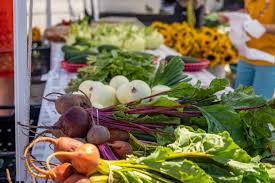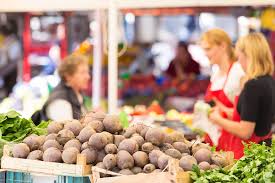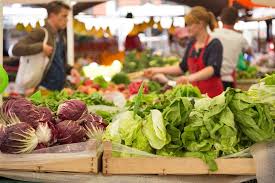Starting a Farmers Market can be an exciting venture that brings fresh produce and community together. It means creating a place where local farmers can showcase their fruits, vegetables, and other goods to people in the neighborhood. Imagine a lively space where folks gather to buy directly from the growers, fostering a connection between the people who grow the food and those who enjoy it.
At its core, starting a Farmers Market means supporting local agriculture and providing a platform for farmers to sell their products. This not only benefits the farmers by giving them a direct market for their produce but also allows consumers to access fresh, seasonal, and often organic foods. It’s about creating a space where the community can appreciate the diversity of local crops and engage in sustainable practices.
One of the joys of starting a Farmers Market is the sense of community it cultivates. It becomes a meeting place for neighbors to interact, share recipes, and learn about the origins of their food. The market serves as a hub for socializing and fostering a sense of belonging, as people come together over a shared love for locally sourced products.
Additionally, launching a Farmers Market involves coordinating logistics, from finding a suitable location to organizing vendors and setting up stalls. It means navigating the regulatory landscape and obtaining necessary permits to ensure a smooth operation. This process requires careful planning and collaboration with local authorities to ensure compliance with regulations.
As a Farmers Market organizer, you become a bridge between producers and consumers, facilitating an environment where both parties can benefit. It involves creating a welcoming atmosphere where farmers feel supported, and customers feel confident in the quality and authenticity of the products they purchase. Building trust is a crucial aspect of starting a Farmers Market.
Furthermore, starting a Farmers Market is an opportunity to promote sustainable and eco-friendly practices. By encouraging local farming, you contribute to reducing the carbon footprint associated with transportation and packaging. This venture is a step towards creating a more environmentally conscious community that values the importance of supporting local ecosystems.
In essence, starting a Farmers Market is about more than just commerce; it’s about fostering a sense of pride in local produce and promoting a healthier, more connected community. It requires dedication, passion, and a commitment to sustainable practices. As you embark on this journey, you not only create a marketplace but also play a vital role in strengthening the ties that bind a community together through the shared love of fresh, locally grown food.
Read Also: Methods of Processing and Marketing Table Birds
How to Start a Farmers Market

Starting a farmers market is an exciting venture that brings together local farmers, artisans, and the community. Follow these simple steps to kickstart your own farmers market and create a thriving hub for fresh produce and community engagement.
Step 1: Research and Planning; Begin by researching the local regulations and permits required for starting a farmers market in your area. Check with the local health department, zoning office, and any other relevant authorities. Once you understand the rules, start planning the market layout, deciding on the market’s schedule, and identifying potential vendors.
Step 2: Gather Support; Get the community involved by reaching out to local farmers, artisans, and residents. Gauge interest and seek support from local businesses, community organizations, and government agencies. Building a strong network will help establish a solid foundation for your farmers market.
Step 3: Location Matters; Choose a suitable location that is easily accessible and has sufficient space for vendors and visitors. Consider parks, community centers, or parking lots. Ensure there are amenities like restrooms and parking available to accommodate the needs of both vendors and attendees.
Step 4: Vendor Recruitment; Invite local farmers, growers, and artisans to participate in your farmers market. Develop a simple application process that outlines expectations, fees, and guidelines. Aim for a diverse mix of vendors to offer a wide variety of products, from fresh produce to handmade crafts.
Step 5: Set Guidelines; Establish clear and simple guidelines for vendors to follow. This may include rules on product quality, display setups, and pricing. Communicate these guidelines effectively to ensure a cohesive and positive market experience for both vendors and customers.
Step 6: Marketing and Promotion; Create a buzz around your farmers market through effective marketing and promotion. Utilize social media, local newspapers, and community bulletin boards. Highlight the unique offerings of your market and emphasize the benefits of supporting local producers.
Step 7: Opening Day Celebration; Plan a grand opening to generate excitement and draw in the community. Consider live music, food tastings, or special promotions. The success of the opening day can set the tone for the market’s future success.
Step 8: Community Engagement; Foster a sense of community by organizing events and activities at the market. This could include cooking demonstrations, workshops, or entertainment for children. Encourage vendors to interact with customers, creating a welcoming and vibrant atmosphere.
Step 9: Evaluate and Adjust; Regularly assess the market’s performance and gather feedback from vendors and attendees. Be open to making adjustments based on the needs and preferences of the community. Continuous improvement will contribute to the long-term success of your farmers market.
Step 10: Sustainability and Growth; Explore opportunities for growth and sustainability. Consider expanding the market to new locations, introducing themed events, or collaborating with local businesses. By staying adaptable and responsive, you can ensure the ongoing success and vitality of your farmers market.
Remember, starting a farmers market is about bringing people together, supporting local businesses, and fostering a sense of community. Keep it simple, enjoyable, and focused on the shared love for fresh, local products.
Read Also: When to Feed each Poultry Feed Types to Birds
Benefits of Starting a Farmers Market

Starting a farmers market offers a multitude of benefits for both the community and local producers. Here are some key advantages:
1. Supporting Local Economy: Farmers markets provide a platform for local farmers and artisans to sell their products directly to the community, keeping money within the local economy.
2. Fresh and Healthy Choices: Consumers gain access to fresh, seasonal produce and locally crafted goods, promoting healthier eating habits and reducing the carbon footprint associated with long-distance transportation.
3. Community Building: Farmers markets serve as a communal gathering space, fostering a sense of community by bringing together residents, farmers, and local businesses.
4. Promoting Sustainable Practices: Local, small-scale farming often employs more sustainable and environmentally friendly practices, contributing to a healthier planet.
5. Educational Opportunities: Farmers markets provide a platform for educational activities such as cooking demonstrations, workshops, and discussions about sustainable agriculture, enhancing community knowledge.
6. Cultural Diversity: These markets often showcase a diverse range of products, reflecting the cultural richness of the community and encouraging cultural exchange.
7. Job Creation: By supporting local producers, farmers markets contribute to job creation within the community, strengthening the local job market.
8. Reducing Food Miles: With products sourced locally, farmers markets help reduce the distance food travels from farm to table, minimizing the environmental impact associated with transportation.
9. Entrepreneurship Opportunities: Farmers markets offer a platform for local entrepreneurs to start small businesses, encouraging innovation and creativity within the community.
10. Healthier Communities: Access to fresh, locally grown produce can contribute to improved community health by encouraging nutritious eating habits and supporting local farmers.
11. Enhanced Food Security: By promoting local agriculture, farmers markets contribute to the resilience of the local food system, enhancing food security in the face of external challenges.
12. Tourism and Local Visibility: A well-established farmers market can attract visitors, boosting local tourism and increasing visibility for the community.
13. Direct Consumer-Farmer Connection: Farmers markets facilitate direct interaction between consumers and farmers, creating a transparent supply chain and fostering trust.
14. Seasonal Awareness: Consumers become more aware of seasonal variations in food production, promoting a better understanding of and connection to the agricultural cycle.
15. Promoting Social Responsibility: Supporting local producers through farmers markets aligns with social responsibility values, encouraging ethical and sustainable consumer choices.
In summary, starting a farmers market offers a range of social, economic, and environmental benefits, making it a valuable initiative for communities aiming to promote local businesses and create a more sustainable and vibrant living environment.
Read Also: Top Finance Companies to Get a Loan – Mariner Finance, Nissan Finance, Snap Finance, etc.

